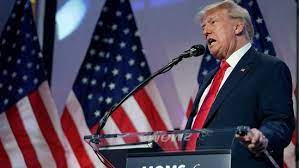Historically, the US has acted as a defender of the liberal international order, promoting democracy, free trade, and international cooperation, benefiting itself and several nations, though with a cost.
A shift towards “America First” as proposed by Donald Trump would likely lead to a more chaotic and unstable world. US allies would be left vulnerable, and norms against aggression and conquest could erode. The global economy would also suffer. The US itself might be insulated from the worst effects of this disorder in the short term due to its geographic advantages and economic strength. However, in the long run, the US would also suffer from the decline of the liberal order and the rise of other powers. According to Hegemonic Stability Theory, presence of a hegemon is essential for a stable world order.
But US responsibility should not to be taken at face value, as it has used it as a pretext on several occasions to further its own agenda, undermining human rights, creating social instability, regime change, covert operations and triggering war and conflicts.
Such a shift in U.S. foreign policy could signify a departure from an extensive strategy spanning 80 years, centered on global accountability and the promotion of liberal principles. Donald Trump’s “America first” doctrine places priority on U.S. interests while diminishing international obligations. His electoral victory in 2016 and increasing sway within the Republican Party reflect a bipartisan weariness with American globalism. Consequently, the U.S. might adopt a more assertive yet less morally-driven stance on the global stage, possibly leading to a tumultuous and less principled international environment. While the U.S. could thrive in the short term under such an approach, other nations might endure substantial repercussions.
Historically, the United States has embraced a broad interpretation of its national interest to establish a stable global order post-World War II. This involved forming global alliances, facilitating post-war reconstruction, and advocating for democracy, contrasting with the exploitative practices of previous great powers. Leaders like President Harry Truman perceived American global engagement as a moral imperative, which contributed to fostering economic prosperity, peace, and democratic governance worldwide. However, there has always been ambivalence among Americans regarding the indefinite maintenance of the global order, shaped by unique historical circumstances.
Recent U.S. presidents, including Trump, have shown a tendency to reduce involvement in the Middle East, reflecting a broader trend of protectionism and skepticism towards international trade agreements within both major political parties. Trump’s “America first” agenda echoes the isolationist sentiments of the pre-World War II America First movement, emphasizing U.S. interests over global cooperation. This approach challenges the traditional U.S. role in defending distant allies and upholding international norms, as seen in the reduction of commitments to the liberal order under Trump’s administration.
A potential “America first” strategy would likely entail a scaled-back global defense posture and decreased participation in international agreements. The U.S. might demand greater contributions from allies or even consider withdrawing from alliances altogether, focusing instead on reinforcing its dominance in the Western Hemisphere. Protectionism would become a central tenet, with the U.S. leveraging its economic power to coerce favorable outcomes.
Critics argue that such a shift could destabilize global stability, leading to increased regional conflicts and economic chaos. However, proponents of the “America first” approach contend that U.S. dominance would allow nations to flourish autonomously. Nevertheless, American retrenchment could provoke aggression from autocratic states like China and ultimately result in long-term global instability.
India has consistently demonstrated a balanced approach in its relationship with the United States, prioritizing a stance centered on multipolarity and regional power blocs, while also advocating for impartial engagement with universal organizations that do not exhibit bias toward the Western world. Furthermore, India recognizes the necessity of countering China’s assertive behavior within a global framework lacking centralized authority. In this context, India perceives the United States as a critical actor whose influence surpasses that of China, and whose involvement is indispensable in containing China’s expansionist tendencies within an increasingly disorderly global landscape.







